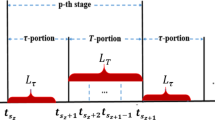Abstract
In the classical theory of self-tuning regulators, it always requires that the conditional variances of the systems noises are bounded. However, such a requirement may not be satisfied when modeling many practical systems, and one significant example is the well-known ARCH (autoregressive conditional heteroscedasticity) model in econometrics. The aim of this paper is to consider self-tuning regulators of linear stochastic systems with both unknown parameters and conditional heteroscedastic noises, where the adaptive controller will be designed based on both the weighted least-squares algorithm and the certainty equivalence principle. The authors will show that under some natural conditions on the system structure and the noises with unbounded conditional variances, the closed-loop adaptive control system will be globally stable and the tracking error will be asymptotically optimal. Thus, this paper provides a significant extension of the classical theory on self-tuning regulators with expanded applicability.
Similar content being viewed by others
References
Guo L, A retrospect of the research on self-tuning regulators, Journal of Systems Science and Mathematical Sciences, 2012, 32: 1460–1471.
Kalman R E, A new approach to linear filtering and prediction problems, Journal of Basic Engineering, 1960, 82: 35–45.
Åström K J and Wittenmark B, On self-tuning regulators, Automatica, 1973, 9: 185–199.
Goodwin G C, Ramadge P J, and Caines P E, A globally convergent adaptive predictor, Automatica, 1981, 17: 135–140.
Lai T L and Wei C Z, Least squares estimates in stochastic regression models with applications to identification and control of dynamic systems, Annals of Statistics, 1982, 10: 154–186.
Kumar P R, Convergence of adaptive control schemes using least-squares parameter estimates, IEEE Transactions on Automatic Control, 1990, 35: 416–424.
Guo L and Chen H, The Åström-Wittenmark self-tuning regulator revisited and ELS based adaptive tracker, IEEE Transactions on Automatic Control, 1991, 36: 802–812.
Guo L, Convergence and logarithm law of self-tuning regulators, Automatica, 1995, 31: 435–450.
Bollerslev T, Chou R Y, and Kroner K F, ARCH modeling in finance: A review of the theory and empirical evidence, Journal of Econometrics, 1992, 52: 5–59.
Bollerslev T, Modelling the coherence in short-run nominal exchange rates: A multivariate generalized arch model, The Review of Economics and Statistics, 1990, 72: 498–505.
Chow and Gregory C, Analysis and Control of Dynamic Economic Systems, John Wiley and Sons, New York, 1975.
Zhang Y and Guo L, Convergence of self-tuning regulators under conditional heteroscedastic noises, 36th Chinese Control Conference, Dalian, 2017.
Ye X, Adaptive nonlinear output-feedback control with unknown high-frequency gain sign, IEEE Transactions on Automatic Control, 2001, 46: 112–115.
Zhang Y, Wen C, and Soh Y C, Adaptive backstepping control design for systems with unknown high-frequency gain, IEEE Transactions on Automatic Control, 2000, 45: 2350–2354.
Guo L, Cheng D, and Feng D, Introduction to Control Theory, Science Press, Beijing, 2005.
Dua P and Batchelor R, Survey vs ARCH measures of inflation uncertainty, Oxford Bulletin of Economics & Statistics, 1993, 55: 341–353.
Engle R F, Autoregressive conditional heteroscedasticity with estimates of the variance of United Kingdom inflation, Econometrics, 1982, 50: 987–1007.
Brooks R D, Faff R W, and McKenzie M D, A multi-country study of power ARCH models and national stock market returns, Journal of International Money and Finance, 2000, 19: 377–397.
Hamilton D, Time Series Analysis, Princeton University Press, New Jersey, 1994.
Goodwin G C and Sin K S, Adaptive Filtering, Prediction and Control, Prentice-Hall, New Jersey, 1984.
Author information
Authors and Affiliations
Corresponding authors
Additional information
This paper was supported by the National Natural Science Foundation of China under Grant No. 11688101.
This paper was recommended for publication by Editor HU Xiaoming.
Rights and permissions
About this article
Cite this article
Zhang, Y., Guo, L. Convergence of Self-Tuning Regulators under Conditional Heteroscedastic Noises with Unknown High-Frequency Gain. J Syst Sci Complex 34, 236–250 (2021). https://doi.org/10.1007/s11424-020-9117-9
Received:
Revised:
Published:
Issue Date:
DOI: https://doi.org/10.1007/s11424-020-9117-9




